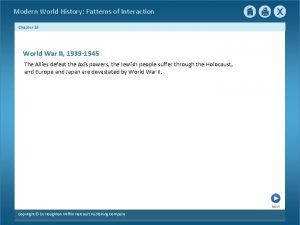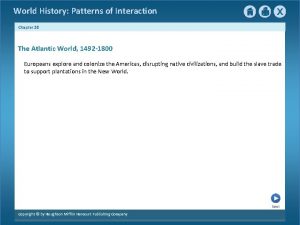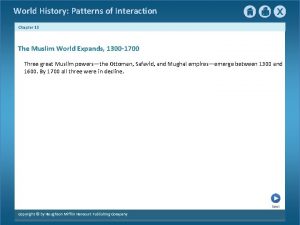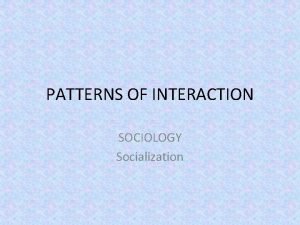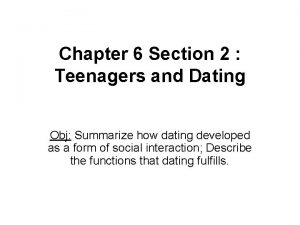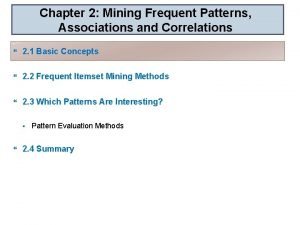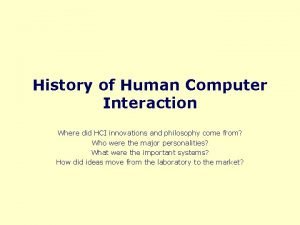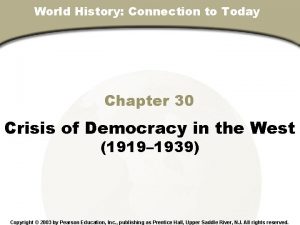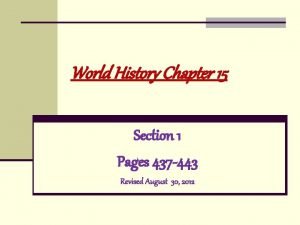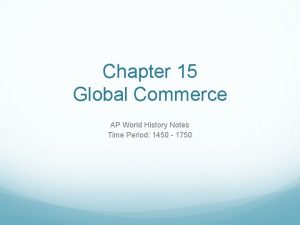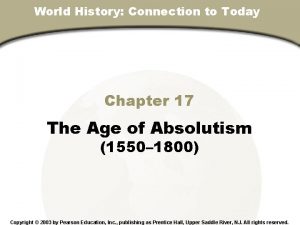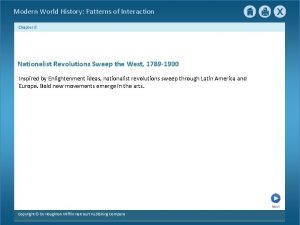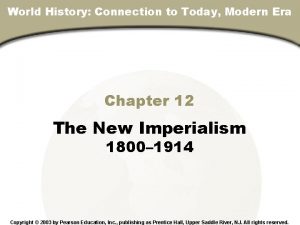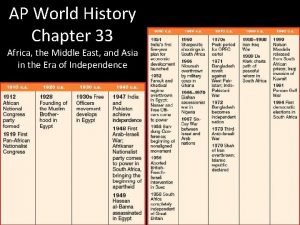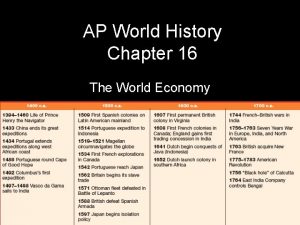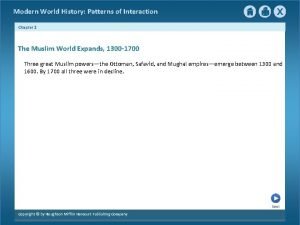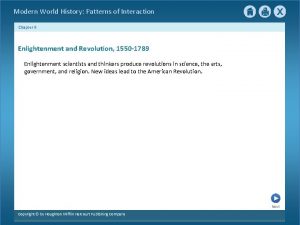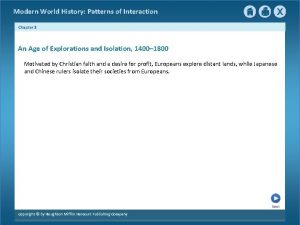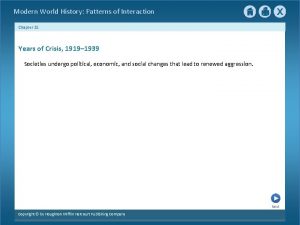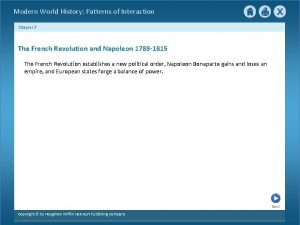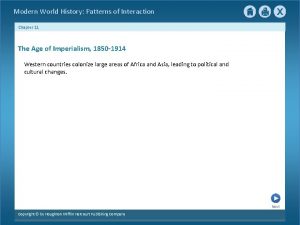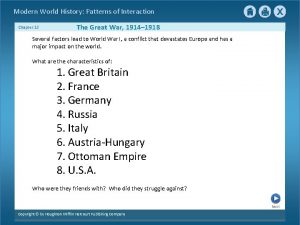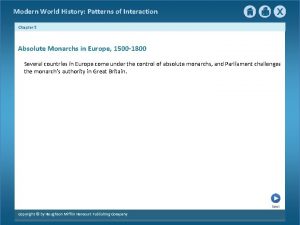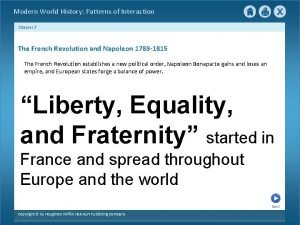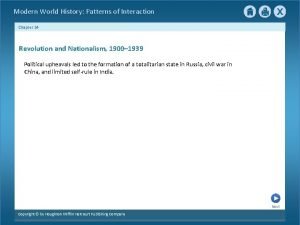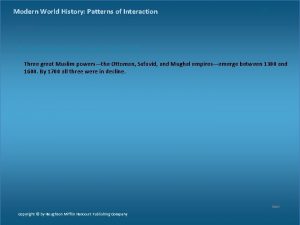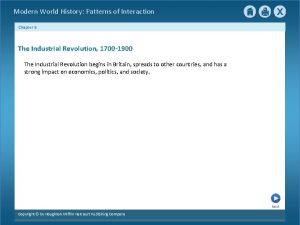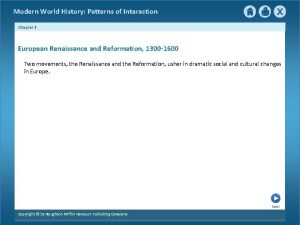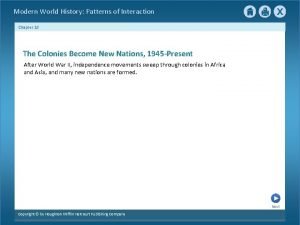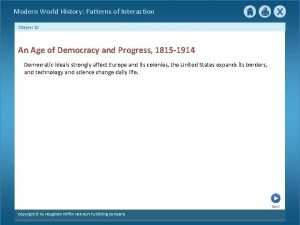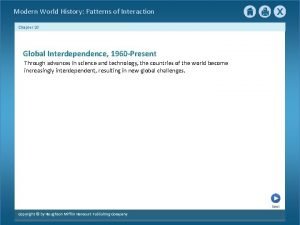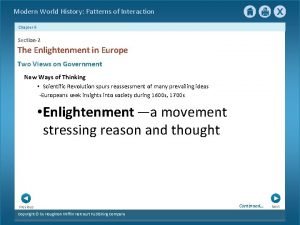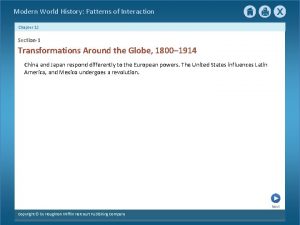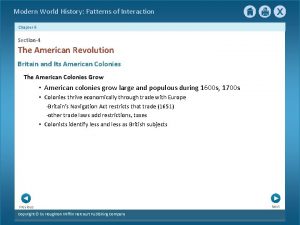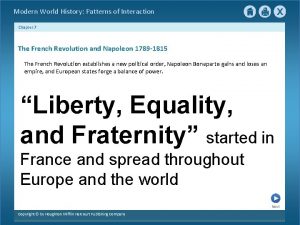Modern World History Patterns of Interaction Chapter 11












































- Slides: 44

Modern World History: Patterns of Interaction Chapter 11 The Age of Imperialism, 1850 -1914 Western countries colonize large areas of Africa and Asia, leading to political and cultural changes. Next Copyright © by Houghton Mifflin Harcourt Publishing Company

Modern World History: Patterns of Interaction Chapter 11 The Age of Imperialism, 1850 -1914 SECTION 1 The Scramble for Africa SECTION 2 CASE STUDY: Imperialism SECTION 3 Europeans Claim Muslim Lands SECTION 4 British Imperialism in India SECTION 5 Imperialism in Southeast Asia Previous Copyright © by Houghton Mifflin Harcourt Publishing Company Next

Modern World History: Patterns of Interaction Chapter 11 Section-1 The Scramble for Africa Ignoring the claims of African ethnic groups, kingdoms, and city-states, Europeans established colonies. Previous Copyright © by Houghton Mifflin Harcourt Publishing Company Next

Modern World History: Patterns of Interaction Chapter 11 The Scramble for Africa Before European Domination Nations Compete for Overseas Empires Imperialism—seizure of a country or territory by a stronger country Problems Discourage Exploration before 1880 • Most interaction had been along the coast • Africans had guns, rivers, disease • Eventually Missionaries, explorers, humanitarians reach interior of Africa • Previous Copyright © by Houghton Mifflin Harcourt Publishing Company Next

Modern World History: Patterns of Interaction Chapter 11 The Congo Sparks Interest • Henry Stanley helps King Leopold II of Belgium acquire land in Congo • “Dr. Livingstone, I presume? ” • Leopold brutally exploits Africans in wild rubber plantations; millions die • Belgian government takes colony away from Leopold • Much of Europe begins to claim parts of Africa Previous Copyright © by Houghton Mifflin Harcourt Publishing Company Next

Modern World History: Patterns of Interaction Chapter 11 Forces Driving Imperialism A need for raw materials and markets for finished products. Factors Promoting Imperialism in Africa • European Nationalism : • need to expand; competition among nations • Technological inventions like steam engine, Maxim gun help conquest • Perfection of quinine protects Europeans from malaria • Within Africa, Africans are divided by language and culture Previous Copyright © by Houghton Mifflin Harcourt Publishing Company Next

Modern World History: Patterns of Interaction Chapter 11 Forces Driving Imperialism Belief in European Superiority • Race for colonies grows out of national pride: Nationalism • Racism—one race is better than others • Social Darwinism—survival of the fittest applied to human society Previous Copyright © by Houghton Mifflin Harcourt Publishing Company Next

Modern World History: Patterns of Interaction P R I M A RY S O U R C E I contend that we [Britons] are the first race in the world, and the more of the world we inhabit, the better it is for the human race. . It is our duty to seize every opportunity of acquiring more territory and we should keep this one idea steadily before our eyes that more territory simply means more of the Anglo-Saxon race, more of the best, the most human, most honourable race the world possesses. Cecil Rhodes, Confession of Faith, 1877 Chapter 11 Previous Copyright © by Houghton Mifflin Harcourt Publishing Company Next

Modern World History: Patterns of Interaction Chapter 11 “The White Man’s Burden”: Kipling’s Hymn to U. S. Imperialism https: //www. youtube. com/watch? v=c. S__4 F 8 QSNU Previous Copyright © by Houghton Mifflin Harcourt Publishing Company Next

Modern World History: Patterns of Interaction Chapter 11 Previous Why didn’t Africans fight back? Some did, but within Africa, Africans were divided by language and culture. They fought each other. When Europeans became a force, one African tribe would go along with the whites in order to dominate an opposition tribe. Copyright © by Houghton Mifflin Harcourt Publishing Company Next

Modern World History: Patterns of Interaction Chapter 11 The Division of Africa The Lure of Wealth • Discovery of gold and diamonds increases interest in colonization Berlin Conference Divides Africa • Berlin Conference — 14 nations agree on rules for division (1884– 85) • to prevent fighting of European nations over the division of Africa • Europeans divided Africa into colonies without consulting African leaders. • By 1914, only Liberia and Ethiopia are free of European control Previous Copyright © by Houghton Mifflin Harcourt Publishing Company Next

Modern World History: Patterns of Interaction Chapter 11 The Division of Africa Demand for Raw Materials Shapes Colonies • Raw materials are greatest source of wealth in Africa: tin, aluminum, copper, gold, silver, diamonds • cash-crop plantations : cocoa, rubber, palm oil, peanuts Previous Copyright © by Houghton Mifflin Harcourt Publishing Company Next

Modern World History: Patterns of Interaction Chapter 11 Three Groups Clash over South Africa Zulus Fight the British • Shaka—Zulu chief—creates centralized state around 1816 • British defeat Zulus: 1887 Previous Copyright © by Houghton Mifflin Harcourt Publishing Company Next

Modern World History: Patterns of Interaction Chapter 11 Three Groups Clash over South Africa Boers (Afrikaners) and British Settle in the Cape • Boers, or Dutch farmers, establish large farms (white people, who are African) • First settled in 1652 • 1814: Gr Br • Boers move north to escape British control Previous Copyright © by Houghton Mifflin Harcourt Publishing Company Next

Modern World History: Patterns of Interaction Chapter 11 Three Groups Clash over South Africa The Boer War • Boer War British versus Boers begins in 1899 • British set up concentration camps and killed women and children • British win • Boer republics united in Union of South Africa (1910) Previous Copyright © by Houghton Mifflin Harcourt Publishing Company Next

Modern World History: Patterns of Interaction Chapter 11 Section-2 Imperialism CASE STUDY: Nigeria Europeans embark on a new phase of empire building that affects both Africa and the rest of the world. Previous Copyright © by Houghton Mifflin Harcourt Publishing Company Next

Modern World History: Patterns of Interaction Chapter 11 Section-2 Imperialism Nigeria A New Period of Imperialism CASE STUDY: Factory Work • Factories pay more than farms, spur demand for more expensive goods Extending Influence • Europeans want to control all aspects of their colonies: -influence political & social lives of people -shape economies to benefit Europe -want people to adopt European customs Previous Copyright © by Houghton Mifflin Harcourt Publishing Company Continued… Next

Modern World History: Patterns of Interaction Chapter 11 A New Period of Imperialism {continued} Forms of Control p. 346 • Europeans develop four forms of control of territory: -colony—governed by a foreign power -protectorate —governs itself, but under outside control -sphere of influence —outside power controls investment and trading -economic imperialism —private business interests assert control Previous Copyright © by Houghton Mifflin Harcourt Publishing Company Continued… Next

Modern World History: Patterns of Interaction Chapter 11 A New Period of Imperialism {continued} Methods of Management • Europeans use two methods to manage colonies: -direct control -indirect control Indirect Control • Limited self-rule for local governments • colonial & local officials Direct Control • Paternalism—Europeans provide for local people, but grant no rights • Assimilation—adaptation of local people to ruling culture Previous Copyright © by Houghton Mifflin Harcourt Publishing Company Next

Modern World History: Patterns of Interaction Chapter 11 A British Colony Gaining Control • Britain conquers southern Nigeria using both diplomacy and force • Conquest of northern Nigeria through Royal Niger Company • In 1914, Britain claims all of Nigeria as a colony Previous Copyright © by Houghton Mifflin Harcourt Publishing Company Next

Modern World History: Patterns of Interaction Chapter 11 African Resistance Africans Confront Imperialism • Broad resistance to imperialism, but Europeans have superior weapons Unsuccessful Movements • Algeria actively resists French for almost 50 years • Samori Touré fights French in West Africa for 16 years • In German East Africa, people put faith in spiritual defense • Results in about 75, 000 deaths; famine kills twice as many Previous Copyright © by Houghton Mifflin Harcourt Publishing Company Next

Modern World History: Patterns of Interaction Chapter 11 African Resistance Ethiopia: A Successful Resistance • Menelik II, emperor of Ethiopia in 1889, resists Europeans -plays Europeans against each other -defeats Italy, remains independent Previous Copyright © by Houghton Mifflin Harcourt Publishing Company Next

Modern World History: Patterns of Interaction Chapter 11 The Legacy of Colonial Rule Negative Effects • Africans lose land independence • Traditional cultures break down • Division of Africa creates problems that continue today Previous Copyright © by Houghton Mifflin Harcourt Publishing Company Next

Modern World History: Patterns of Interaction Chapter 11 The Legacy of Colonial Rule Positive Effects • reduced local fighting • Sanitation improved • hospitals and schools were created • Technology brought economic growth • The Gospel was proclaimed to people who had never heard of Jesus Christ Previous Copyright © by Houghton Mifflin Harcourt Publishing Company Next

Modern World History: Patterns of Interaction Chapter 11 Section-3 Europeans Claim Muslim Lands European nations expand their empires by seizing territories from Muslim states. Previous Copyright © by Houghton Mifflin Harcourt Publishing Company Next

Modern World History: Patterns of Interaction Chapter 11 Section-3 Europeans Claim Muslim Lands Ottoman Empire Loses Power Problems Discourage Exploration • Armies, rivers, disease discourage exploration Reforms Fail • After Suleyman I dies in 1566, empire starts to decline • Ottoman Empire falls behind Europe in technology • Selim III attempts to modernize army and is overthrown • 1830: Greece independent • 1817: Serbia independent • European powers look for ways to take Ottoman lands Previous Copyright © by Houghton Mifflin Harcourt Publishing Company Next

Modern World History: Patterns of Interaction Europeans Grab Territory Chapter 11 Geopolitics • Geopolitics —taking land for its strategic location or products • Access to sea trade routes focuses attention on Ottoman lands Russia and the Crimean War • Crimean War—Russia attacks Ottomans in 1853 to gain warm-water port • Russia loses, but Ottomans are shown to be weak; still lose land Previous Copyright © by Houghton Mifflin Harcourt Publishing Company Next

Modern World History: Patterns of Interaction Chapter 11 Europeans Grab Territory The Great Game • Great Game—conflict between Russia and Britain over Iran, Afghanistan, and Central Asia in general Previous Copyright © by Houghton Mifflin Harcourt Publishing Company Next

Modern World History: Patterns of Interaction Chapter 11 Persia Pressured to Change The Exploitation of Persia • Russia wants access to Persian Gulf and Indian Ocean • Britain wants Persian oil and Afghanistan • Persia concedes to Western businesses • In 1907, Russia and Britain seize and divide Persia between them Previous Copyright © by Houghton Mifflin Harcourt Publishing Company Next

Modern World History: Patterns of Interaction Chapter 11 Egypt Initiates Reforms Military and Economic Reforms • Muhammad Ali breaks away from Ottoman control and rules Egypt • Begins series of reforms in military and economy • Shifts Egyptian agriculture from food crops to cash crops Previous Copyright © by Houghton Mifflin Harcourt Publishing Company Next

Modern World History: Patterns of Interaction Chapter 11 Egypt Initiates Reforms The Suez Canal • Egypt builds Suez Canal—waterway connects Red Sea to Mediterranean • Modernization efforts create huge debt • British oversee financial control of canal, occupy Egypt in 1882 Previous Copyright © by Houghton Mifflin Harcourt Publishing Company Next

Modern World History: Patterns of Interaction Chapter 11 Section-4 British Imperialism in India As the Mughal Empire declined, Britain seizes Indian territory and soon it controls almost the whole subcontinent. Previous Copyright © by Houghton Mifflin Harcourt Publishing Company Next

Modern World History: Patterns of Interaction Chapter 11 British Imperialism in India Section-4 Problems Discourage Exploration • Armies, rivers, disease discourage exploration British Expand Control over India British East India Company Dominates Trade and politics • British East India Company rules India until 1850 s • Company has its own army led by British officers • Army is staffed by sepoys—Indian soldiers Previous Copyright © by Houghton Mifflin Harcourt Publishing Company Continued… Next

Modern World History: Patterns of Interaction Chapter 11 Section-4 British Imperialism in India British Expand Control over India Britain’s “Jewel in the Crown” • India is Britain’s most valuable colony, or “jewel in the crown” • Forced to produce raw materials for British manufacturing • Also forced to buy British goods Previous Copyright © by Houghton Mifflin Harcourt Publishing Company Continued… Next

Modern World History: Patterns of Interaction Chapter 11 British Expand Control over India {continued} British Transport Trade Goods • Railroads move cash crops and goods faster • Trade in specific crops is tied to international events Impact of Colonialism • British hold much of political and economic power • Cash crops result in loss of selfsufficiency led to famine • British modernize India’s economy and improve public health Previous Copyright © by Houghton Mifflin Harcourt Publishing Company Next

Modern World History: Patterns of Interaction Chapter 11 The Sepoy Mutiny Indians Rebel • Sepoys refuse to use cartridges of new rifles for religious reasons • Many Sepoys are jailed; others start Sepoy Mutiny against British • Many Indians, especially Sikhs, remain loyal to British Turning Point • British put down rebellion, take direct command of India • Raj—term for British rule over India, lasts from 1757 to 1947 • Uprising increases distrust between British and Indians Previous Copyright © by Houghton Mifflin Harcourt Publishing Company Next

Modern World History: Patterns of Interaction Chapter 11 Nationalism Surfaces in India Call for Reforms • In 1800 s, Ram Mohun Roy leads modernization movement • Many Indians adopt western ways and call for social reforms • Indians resent being second-class citizens in own country Nationalist Groups Form • Indian National Congress and Muslim League form • Nationalists angered by partition of Bengal -pressure forces Britain to divide it differently Previous Copyright © by Houghton Mifflin Harcourt Publishing Company Next

Modern World History: Patterns of Interaction Chapter 11 Section-5 Imperialism in Southeast Asia Demand for Asian products drive Western imperialists to seek possession of Southeast Asian lands. Previous Copyright © by Houghton Mifflin Harcourt Publishing Company Next

Modern World History: Patterns of Interaction Chapter 11 Section-3 Imperialism in Southeast Asia European Powers Invade the Pacific Rim Problems Discourage Exploration • Armies, rivers, disease discourage exploration Europeans Race to Claim Pacific Rim • Lands of Southeast Asia that border Pacific Ocean form Pacific Rim • Dutch, British, French, Germans claim parts of Pacific Rim -establish trading ports -want plantation agriculture Dutch Expand Control • Dutch colonies, called Dutch East Indies, include Indonesia • Settle Indonesia, establish rigid social class system Previous Copyright © by Houghton Mifflin Harcourt Publishing Company Continued… Next

Modern World History: Patterns of Interaction Chapter 11 European Powers Invade the Pacific Rim {continued} The Exploitation of Persia • Russia wants access to Persian Gulf and Indian Ocean • Britain wants Persian oil and Afghanistan • Persia concedes to Western businesses British Take the Malayan Peninsula • Britain seizes Singapore as a port and trading base • Also gets colonies in Malaysia, Burma • Chinese immigration to Malaysia creates problems French Control Indochina • French come to control Vietnam, Laos, Cambodia • Directly control French Indochina • Export rice, angering Vietnamese Previous Copyright © by Houghton Mifflin Harcourt Publishing Company Continued… Next

Modern World History: Patterns of Interaction Chapter 11 European Powers Invade the Pacific Rim {continued} Colonial Impact • Modernization mainly helps European businesses • Education, health, sanitation improve • Millions migrate to Southeast Asia to work in mines, plantations • Colonialism leads to racial and religious clashes Previous Copyright © by Houghton Mifflin Harcourt Publishing Company Next

Modern World History: Patterns of Interaction Chapter 11 Siam Remains Independent Modernization in Siam • Siam remains independent, neutral zone between French, British • King Mongkut modernizes country: -starts schools -reforms legal system -reorganizes government -builds transportation and telegraph systems -ends slavery Previous Copyright © by Houghton Mifflin Harcourt Publishing Company Next

Modern World History: Patterns of Interaction Chapter 11 U. S. Imperialism in the Pacific Islands The Philippines Change Hands • U. S. gains Philippines after Spanish-American War • Emilio Aguinaldo leads Filipino nationalists against U. S. rule • U. S. defeats three-year nationalist revolt (1902) • U. S. promises to prepare Filipinos for self-rule • Focus on cash crops leads to food shortages Previous Copyright © by Houghton Mifflin Harcourt Publishing Company Continued… Next

Modern World History: Patterns of Interaction Chapter 11 U. S. Imperialism in the Pacific Islands {continued} Hawaii Becomes a Republic • Americans establish sugar-cane plantations on Hawaii • By mid-1800 s, sugar accounts for 75 percent of Hawaii’s wealth • U. S. business leaders want annexation—adding territory to country • Queen Liliuokalani tries to restore Hawaiian control • American businessmen have her removed from power • U. S. annexes Republic of Hawaii (1898) Previous Copyright © by Houghton Mifflin Harcourt Publishing Company Next
 World history patterns of interaction
World history patterns of interaction Chapter 20 section 1 world history
Chapter 20 section 1 world history World history patterns of interaction
World history patterns of interaction World history patterns of interaction
World history patterns of interaction Ap world history chapter 25 africa and the atlantic world
Ap world history chapter 25 africa and the atlantic world History gcse spec
History gcse spec Group dynamics communication
Group dynamics communication Patterns of interaction sociology
Patterns of interaction sociology Function of group dynamics
Function of group dynamics Dangerous world tour
Dangerous world tour In traditional dating patterns dating behavior
In traditional dating patterns dating behavior Mining frequent patterns associations and correlations
Mining frequent patterns associations and correlations History of hci
History of hci Chapter 17 section 3 luther leads the reformation
Chapter 17 section 3 luther leads the reformation Chapter 32 assessment world history
Chapter 32 assessment world history Chapter 30 section 2 world history
Chapter 30 section 2 world history Chapter 15 section 2 world history
Chapter 15 section 2 world history Temujin ap world history
Temujin ap world history Chapter 15 section 3 world history
Chapter 15 section 3 world history Chapter 15 assessment world history
Chapter 15 assessment world history Ap world history chapter 15 notes
Ap world history chapter 15 notes Chapter 17 assessment world history
Chapter 17 assessment world history World history chapter 8 section 1
World history chapter 8 section 1 Chapter 23 section 3 world history
Chapter 23 section 3 world history History alive chapter 8
History alive chapter 8 Ap world chapter 16 vocab
Ap world chapter 16 vocab Chapter 8 section 1 world history
Chapter 8 section 1 world history Chapter 11 ap world history notes
Chapter 11 ap world history notes Chapter 16 section 1 world history
Chapter 16 section 1 world history History alive the ancient world chapter 14
History alive the ancient world chapter 14 Chapter 10 ap world history
Chapter 10 ap world history Abolitionist movement ap world history
Abolitionist movement ap world history Commerce ap world history
Commerce ap world history Chapter 12 assessment world history
Chapter 12 assessment world history Ap world history chapter 33
Ap world history chapter 33 Ap world history chapter 28 outline
Ap world history chapter 28 outline Ap world history chapter 16
Ap world history chapter 16 Chapter 19 assessment world history
Chapter 19 assessment world history Chapter 14 section 1 world history
Chapter 14 section 1 world history Hellenistic doctors increased their knowledge by
Hellenistic doctors increased their knowledge by Ap world history chapter 20
Ap world history chapter 20 Chapter 9 section 2 world history
Chapter 9 section 2 world history Chapter 4 section 4 world history
Chapter 4 section 4 world history From hunters and gatherers to farmers chapter 3
From hunters and gatherers to farmers chapter 3 Chapter 20 worlds apart the americas and oceania
Chapter 20 worlds apart the americas and oceania
